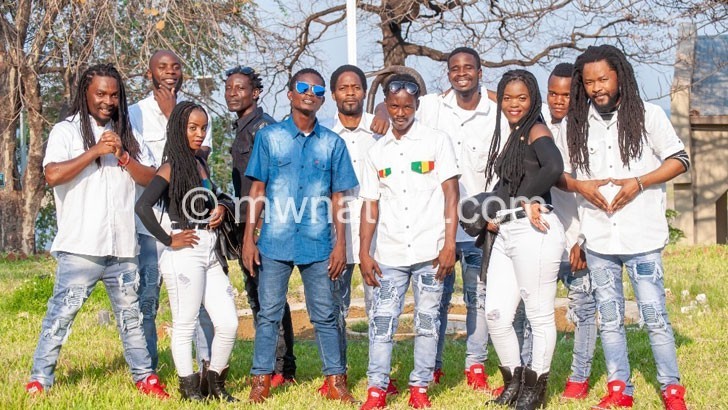The task of relaunching the wailing brothers
The story of reggae band, Wailing Brothers, has often been told in bits and pieces. Most of the talk is centred around 1999 when the group dropped its first album.
But at that time when Evison Matafale was the band’s lead vocalist, they had been around for a while.
The group’s current leader Takudziwani Chokani recalls that in 1994, when the group had just been formed by his deceased brother Elias Chokani, the country’s sole radio station MBC Radio 1 and a few others, which were very expensive to afford provided the only options for recording music.

“Even then, the operations at MBC were very restrictive. It is not like you could just wake up and say you are going to record a song,” he says.
But this did not discourage the family band from incorporating other names such as Romeo and Yohane Kanjunju, Evison Matafale, Michael Jana and Kingsley Chikaphupha.
They kept on practising and fine tuning their reggae beat at home until an alternative music studio in the name of Studio K came into existence.
Chokani said: “It was not only cheaper, but also closer to our base in Chilobwe.”
The group recorded their first ever album, Jingles, at Studio K but did not fair well on the market.
“For a moment, it appeared like the dream was over. Matafale went into teaching and later trekked to Zimbabwe. Elias also went to South Africa,” he said.
Meanwhile things were changing in Malawi and new radio stations opened. All these new media outlets were receptive of almost all types of music, local or otherwise.
It was in 1998 when Elias Chokani and Matafale met in Zimbabwe and agreed on returning with the hope of reviving their music dreams. Upon the two’s return, the Wailing Brothers regrouped.
According to Chokani, things did not just click into gear immediately. After producing their demo for what would be their first official debut album, Kuyimba 1, another problem arose. The group did not have funds to go and record the songs at a proper recording studio.
Chokani recalls: “We knocked on almost every door possible. It was our uncle Davis Kapito [now deceased] who bailed us out eventually.”
He said when they had completed the recording, they brought Kapito the final copy and he was surprised with their works.
“He was in total disbelief. Instantly, he helped us identify a manager. That was when Chakuchanya Harawa came in as the group’s manager. The rest is history,” he said.
The Kuyimba 1 album went on to be a huge success enjoying massive airplay on different radio stations and the sole television station then, Television Malawi (TVM).
But the unexpected was to happen. Matafale, who the success of Kuyimba 1 hugely hinged on, announced he was moving on to form his own group.
Chokani says: “Now this is a part of the story that so many people do not understand. There was no fallout or whatsoever between Matafale and the other members of the group. He explained to us as his brothers.
“He was seeking new growth as an artist and he went with everybody’s blessings. In fact, he took myself, Paul, Gift Thugo and Felix Kamwendo on board on the production of his second album since he said he did not want to lose the reggae touch he had established with us.”
The band regrouped to launch their 2016 album Unfinished Business which had Takudziwani, Paul Chokani and Chikumbutso Simbi on the vocals. But they failed to replicate the success of their first album.
Since then, the group has rolled in the doldrums. It was only few months ago that an announcement was made of their being signed under the CoolPro Entertainment music stable.
“It is a dream. God has answered the prayers that we have had for years. It is a fulfilment of the vision we have had for years,” beamed Chokani.
Under CoolPro, the group has undergone rebranding. For the first time, it has female members among its ranks, Empress Bree Ice and Razzy. The group has also roped in new lead vocalists in Lion Paw and Paul Kalumbi.
CoolPro’s Duffy Chikakuda said the plan is to make the group break the international market by releasing music which can compete at any level.
Lead vocalist Lion Paw said he is aware of the group’s history in terms of leading the vocals line: “It is a big task, but I will work very hard to fit in well.”
Music commentator Hessie Ndevu said: “Of course, they have maintained the reggae touch which they have always been known for which is their strength. But other than that there are issues of originality. They are yet to find themselves an identity to run with.”
“You can hear some elements of Black Missionaries, especially during the time it was led by Musamude.”





